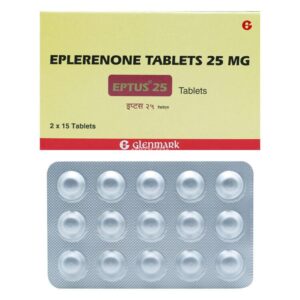EPLERNONE
EPLERNONE: Eplerenone is a medication primarily used to treat high blood pressure and heart failure. It belongs to a class of drugs called selective aldosterone receptor antagonists.
The main mechanism of action of eplerenone is the selective blockade of aldosterone receptors in the body. Aldosterone is a hormone that regulates the balance of salt and water in the body, and its overactivation can lead to high blood pressure and fluid retention. By blocking the aldosterone receptors, eplerenone helps to reduce blood pressure and decrease the risk of cardiovascular events such as heart attack and stroke.
The recommended dose of eplerenone depends on the specific indication being treated. For hypertension (high blood pressure), the typical starting dose is 50 mg once daily, which can be increased to 50-100 mg once daily as needed to control blood pressure. For heart failure, the usual starting dose is 25 mg once daily, which can be increased to a maximum of 50 mg once daily.
Like any medication, eplerenone may cause side effects. Common side effects include dizziness, headache, fatigue, diarrhea, stomach pain, and hyperkalemia (high levels of potassium in the blood). It is important to monitor potassium levels periodically while on eplerenone. Other rare but serious side effects may include allergic reactions, liver problems, and low blood pressure. It is important to seek medical attention if any severe side effects or symptoms occur.
It is also worth noting that eplerenone is contraindicated in patients with severe kidney impairment, significantly elevated potassium levels, or who are taking certain medications that can interact with eplerenone and increase the risk of side effects. It is always recommended to consult with a healthcare professional before starting any new medication.


